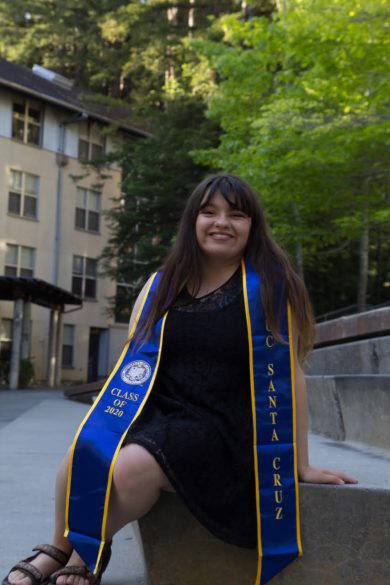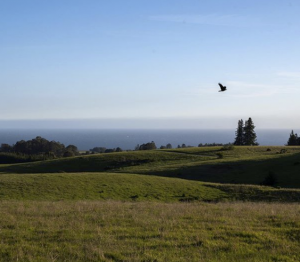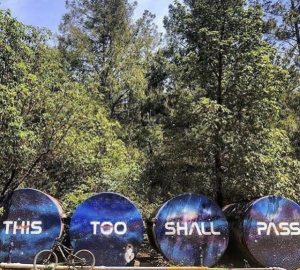By Zoe Quinton

Isabella Elmore is a senior undergraduate in the Literature department at UC Santa Cruz. Her research project, The Power of Fragmentation: Re-Translating the Middle Passage, was awarded a 2020 THI Undergraduate Research Fellowship. Her scholarship focuses on the things that are left unsaid in official recorded histories, and how we can use the gaps in those stories to reinterpret history and the ways in which we record it.
For THI, Zoe Quinton spoke with Isabella this week about her hopes to become an anti-racist educator, her favorite things about UC Santa Cruz, and how she’s coping with the COVID-19 shutdown.
Isabella and other THI Undergraduate Fellows will be recognized at the Humanities Spring Awards on June 5, 4:00pm, on Zoom. RSVP to join us virtually for the celebration.
Can you tell us more about The Power of Fragmentation: Re-Translating the Middle Passage? When did you start this research project? What drew you to it?
My project hones in on three literary works: Toni Morrison’s Beloved, Michelle Cliff’s Free Enterprise, and Robin Coste-Lewis’ Voyage of the Sable Venus. I started thinking about this project with my mentor Susan Gillman in the middle of Fall 2019 and officially began researching in Winter 2019.
With this thesis, I aim to look within and across these three works at how each one uses fragmentation in language and stories as a way to draw out the gaps and fissures in officially recorded histories. I found that each of these works brings not only the feeling of unfinishedness to the forefront through the fragments making up the texts, but also addresses the unfinishedness of history itself, as it reveals the silences within these stories that are either centered on or stemming from the Middle Passage. Looking closely at each fictional work, I analyze how the fragmented pieces of the text, as a collective, act as a mode of re-translation on history and the recording of history.
“I created this project… to explore how fictional books and poetry can be agents of history in and of themselves.”
I was drawn to this project because through it I found myself learning more about history in terms of how it is “curated,” recorded, remembered, and passed on through these works—more so than most of the history textbooks I ever read in high school. In examining my learning of history I discovered that there’s a gap in the knowledge I was taught about the Middle Passage and abolitionism that I’m researching and writing to fill (if even only a little bit). I created this project because I believe that it is necessary to ask why this gap exists in the first place, how the official historical narrative works, and to explore how fictional books and poetry can be agents of history in and of themselves. I hope this project will contribute to my learnings in anti-racist pedagogy as an anti-racist educator.
You are a senior-year undergraduate—what have been the highlights of your time at UC Santa Cruz? What have been some of the challenges you’ve worked through? How have your academic goals shifted during this time?
Some of the highlights of my time at UC Santa Cruz have been getting involved at Colleges Nine and Ten (and meeting most of my closest friends thanks to it), getting lost in the forest on hikes with my friends, going on runs from campus to Westcliff, Bubble Event sunsets at Porter College, sunrises and sunsets at OPERS, and late night study sessions at McHenry Library.
I came into college as a first-generation student without a clue as to what to expect from it. I distinctly remember my friends’ parents telling me to make sure I went to office hours and having absolutely no idea what they were talking about! But ever since I was little, I’ve always been drawn to people: our stories, movements, histories, learning, understandings, cultures, societies, and communities.
“I came into college as a first-generation student without a clue as to what to expect from it.”
These interests and passions eventually led me to double major in Literature and Psychology with a minor in Education. In the summer after my sophomore year at UC Santa Cruz I stumbled on an internship working as a classroom facilitator in a summer school with first graders, where I had the chance to share my love for storytelling and community building.
That summer, along with subsequent ones, paired with my classes and extra-curricular experiences at College Ten, really energized and inspired me. I loved being in the classroom space so much that I decided to work towards becoming an Elementary School teacher. This past year I applied to graduate school programs for a Masters in Education and a teaching credential in elementary education and I’m excited to say I will be joining UC Berkeley’s BE3 program for the 2020-2021 school year!
Congratulations! That’s excellent news.
Can you tell us about your life outside of class? Any activities, hobbies, sports, or creative pursuits that help you to feel whole?
Outside of class I’ve spent a lot of time getting to know community members and organizers at Food Not Bombs, the Homeless Garden Project, Shared Adventures, Homeless Connect, Grey Bears, Calabasas Elementary and Calabasas Garden, Second Harvest Food Bank, and more with Praxis, College Nine and Ten’s service learning group. I’m happy to say I found this space my first quarter here and haven’t left it since.
When I’m not spending time with Praxis, I’m usually out in one of the many campus gardens journaling, writing poetry, practicing film photography with a friend, watching the 2005 Pride and Prejudice movie for the gazillionth time, getting Penny’s ice cream with marshmallow fluff (always), or hiking around Pogonip.
How has the environment of Santa Cruz itself shaped your time here as an undergraduate?
I chose Santa Cruz as a freshman because I felt like the environment was the calming surroundings that my anxious self needed. Being able to hike to class has definitely helped my anxious nerves more than once, and I’m so thankful to have had four adventure-filled years in such a magical place with a fantastic community and support system.
This has been a very strange year so far in terms of the global COVID-19 pandemic. How are you coping in this current moment, both in terms of your academic life and daily life? What do you do to try to stay focused and stay sane?

UC Santa Cruz campus.
Like everyone else, this year has definitely been a little rocky in ways that no one could have predicted. The pandemic hit and I realized that I wouldn’t get the chance to say goodbye to my classmates and close friends with a graduation celebration or even a hug. It’s been especially strange for me to not talk to multiple people in person in classes or even in passing walking around campus. Processing these losses was hard, but I know that I’m not alone. I’m working to find ways to celebrate graduating with my family and friends, and am looking forward to being able to give them all hugs when this passes.
“Be gentle with yourself, and with others, if you start to worry about what the future holds.”
In this current moment in time and space, I’m making sure to get outside and give my body the movement it needs to feel like I’ve done even one small thing. I really love having mini dance parties with my roommate or doing yoga in my room following classes online. I’m one of a few students still living on campus, so I also really enjoy biking or running around while it’s so empty!
Any tips for your fellow undergraduates, or questions you are asking yourself now, about the future or otherwise?

Water tanks on upper campus above colleges nine and ten. Photo credit: Karen Loutzenheiser.
I’ve been asking myself what the future holds in terms of graduate school and what life will look like after schools and businesses begin to reopen, but for now I think my tip is to be gentle. Be gentle with yourself when you feel like you’re not doing enough. Be gentle with yourself, and with others, if you start to worry about what the future holds. We’re all going through it, and these are certainly unprecedented times. If you see someone from six feet away, give them an “eye smile” from behind your mask and say hello! Be gentle and be kind, to others and yourself.
Isabella Elmore will be celebrated along with other THI Undergraduate Fellows at the Humanities Spring Awards on June 5, 4:00pm, on Zoom. RSVP to join us virtually for the celebration.